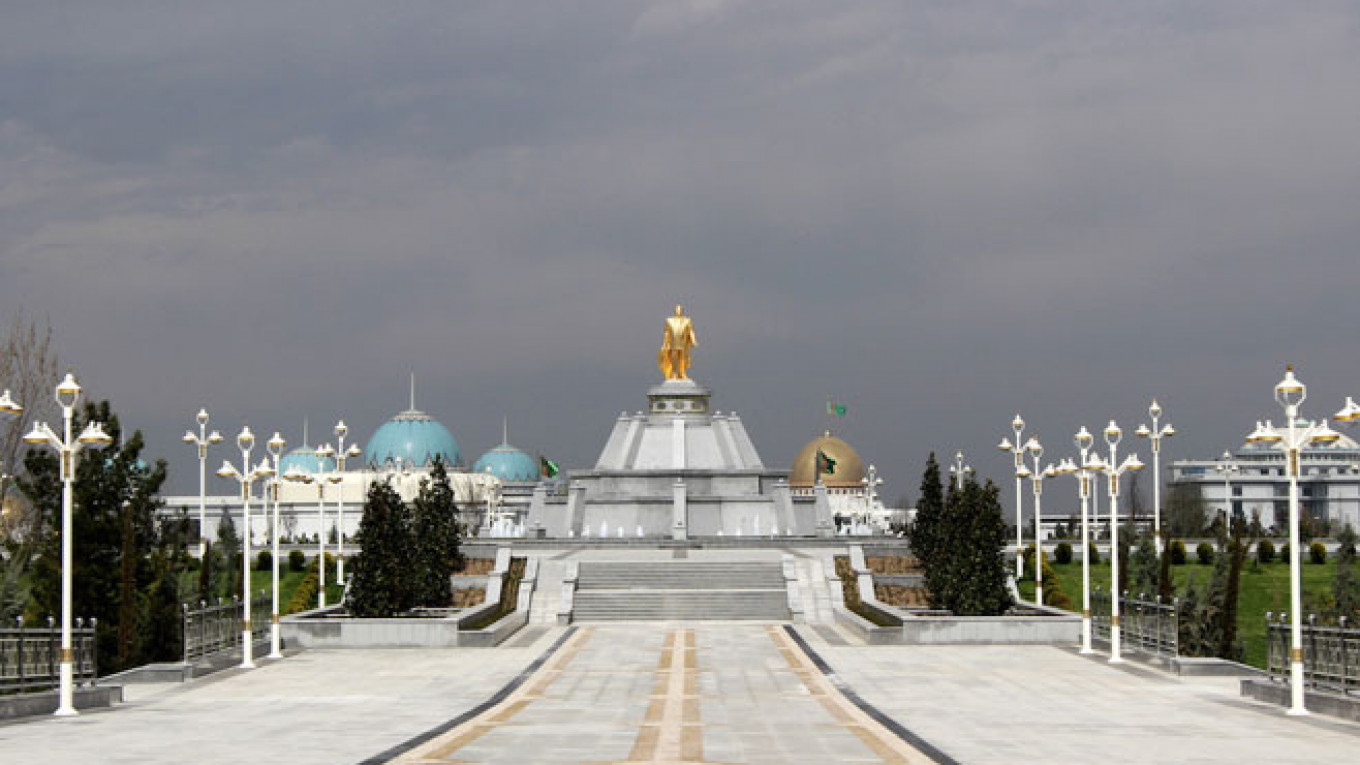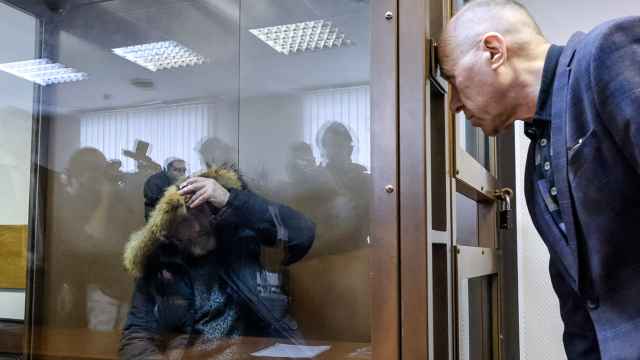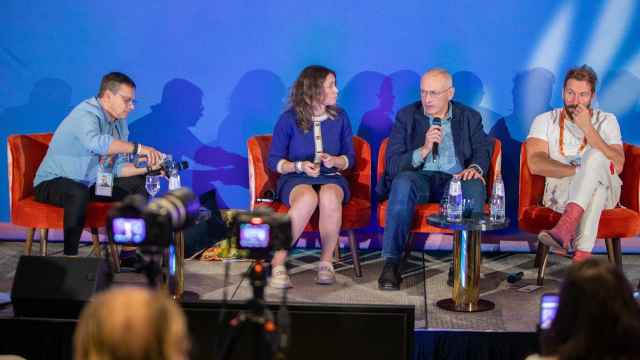ASHGABAT, Turkmenistan — The grandiose desert city of Ashgabat, capital of Turkmenistan, is a dreamscape in white marble, an oasis of opulence on a terrain where little seems to grow except ambition and immaculate high-rises.
Sandwiched between the Karakum Desert and the Kopet Dag mountains on Turkmenistan's border with Iran, Ashgabat's name translates as "City of Love" in Turkmen and Arabic. The locals pride themselves that while its Western rival in romance — Paris — may be better known, Ashgabat's streets are cleaner. In fact, they are spotless. Stooped women in floor-length traditional Turkmen dresses, their noses concealed in vividly colorful scarves against the dust, methodically sweep the asphalt, buff the silver railings and tend to the foliage that graces Ashgabat's boulevards.
See the photo gallery: Ashgabat: A White Marble Oasis of Opulence in the Turkmen Desert
There is no smoking, spitting or loitering on the streets of Ashgabat. While the streets of southern capitals are often packed with stray animals, in three days in Ashgabat, this journalist saw only one alley cat.
"The cats are at home," said a local university student who, like his peers, was wearing the national uniform: a black suit and tie, a white dress shirt and a takhya, a traditional embroidered skullcap.
The people, it would seem, are also at home. The streets of this city of 650,000 are eerily quiet. Ashgabat's vast parks and squares, stippled with illuminated fountains, have few pedestrians. Placed at regular intervals along the city's thoroughfares, policemen at times outnumber civilians. Soldiers guarding the Turkmen capital's landmarks, including the three-legged Arch of Neutrality and the Eternal Flame monument, stare at deserted open spaces.
Most women in Ashgabat wear traditional shiny long-sleeved dresses in public. Western outfits are permissible but rare. Unmarried women, who also sport skullcaps, wear their raven hair in two long braids that dangle on their chests, while married women trade their braids for colorful headscarves that cover the back of their heads.
Superlative City
Ashgabat's people are discreet, but the city's architecture precociously craves attention. Its civic ego is built on its monumental infrastructure projects. The Turkmen capital has set Guinness World Records for having the highest density of white marble-clad buildings, the largest number of fountain pools in a public place and the largest architectural star, which is built into the facade of the Turkmenistan Broadcasting Center. The city also boasts the largest Ferris wheel with enclosed cars, the largest velodrome — with 6,000 seats — and the largest handwoven carpet, which hangs in the National Carpet Museum.
The construction cranes that dot Ashgabat's cityscape are evidence of the country's booming economy. In 2013, the country saw its gross domestic product grow more than 10 percent, supported by its exports of hydrocarbons and public investment, according to the World Bank. The country sits on the sixth-largest natural gas reserve in the world and 600,000 million barrels of crude oil reserves, according to authorities in the energy field.
The people of Turkmenistan have not paid for gas, electricity or water since 1993, and authorities had reportedly pledged that this would remain the case until 2030. Turkmen President Gurbanguly Berdimuhamedow said last year that the unlimited supply would come to an end with the introduction of meters, though for now, nothing has changed. Gasoline costs "pennies," a local driver said.
Turkmenistan may be essentially closed to individual tourists — visas are virtually impossible to obtain — but it is certainly open for business. The country hired Turkish construction company Polimeks to build the $5 billion Ashgabat Olympic Complex, which will host the Asian Indoor and Martial Arts Games in 2017. French industrial group Bouygues has completed a number of construction projects in Turkmenistan, including the five-star Yyldyz Hotel that overlooks Ashgabat. The names of foreign companies — Toyota, Nestle, Michelin, Lenovo — feature on the facade of some marble buildings.
The paucity of pedestrians and vehicles — most of which are white to match the cityscape — give Ashgabat the appearance of a Potemkin village, an elaborate front meant to mask underlying realities. The country's riches do not appear to trickle down to the general population, whose minimum wage is 535 manats ($153) a month. The white marble palaces of central Ashgabat give way to worn Soviet-era buildings on the outskirts of the city.
Father of the Nation
The man praised for the order and mega-projects is President Berdimuhamedow. The former dentist came to power in 2006 following the death of authoritarian leader Saparmurat Niyazov, the self-appointed Father of the Turkmen. Oversized portraits of Berdimuhamedow are ubiquitous throughout the capital. The president's beaming smile, worthy of a toothpaste commercial, dominates the front pages of Turkmenistan's newspapers and the covers of its magazines.
Berdimuhamedow is the president of superlatives. In conversation and at official events, he is referred to as the "esteemed" or "dear" president. He also goes by "the Protector."
The president is also Turkmenistan's ultimate overachiever. The walls of Turkmenistan's National Institute of Sports and Tourism are punctuated with portraits of Berdimuhamedow excelling at nearly every conceivable athletic discipline. He shoots pucks as well as he bowls strikes. He masters judo techniques and the art of taming wild Central Asian stallions.
Most locals voice their esteem for Berdimuhamedow to foreign guests. They commend him for the clean streets, free utilities and colossal monuments.
"We strive to be like him," one Turkmen official said. "Seriously."
Personality Cult
The president's rare critics privately claim that the expressions of respect and veneration for Berdimuhamedow stem from the fear his regime instills in the population.
An Ashgabat taxi driver who requested anonymity to protect his identity told The Moscow Times that the president's rule was enforced by a group of loyal followers.
"The president has family everywhere," he said, dropping the habitual superlatives. "His people make sure things are done the way he wants."
Affronts to Berdimuhamedow, or images of him, have grave consequences. Human rights organizations have deplored the regime's threat of imprisonment to deter any opposition.
In a story chillingly reminiscent of anecdotes about Stalin's image during the Soviet dictator's reign, the taxi driver recalled how last month, in keeping with the pristine spirit of Ashgabat's neat freaks, he had placed an old newspaper on the floor of his car to absorb the March mud from his passengers' shoes. He was pulled over for a random identity check, a common occurrence in Ashgabat. The policeman ordered him out of his car and upon discovering the newspaper — which inevitably bore the president's ubiquitous image — threatened to fine him for daring to put Berdimuhamedow's face under people's muddy feet.
Despite the policeman's threat, the driver eventually managed to talk his way out of the situation.
"I told him it's not my fault that the president is on every page," he said.
The Moscow Times visited Ashgabat as a guest of the Turkmenistan International Sports Media Forum 2015.
Contact the author at [email protected]
A Message from The Moscow Times:
Dear readers,
We are facing unprecedented challenges. Russia's Prosecutor General's Office has designated The Moscow Times as an "undesirable" organization, criminalizing our work and putting our staff at risk of prosecution. This follows our earlier unjust labeling as a "foreign agent."
These actions are direct attempts to silence independent journalism in Russia. The authorities claim our work "discredits the decisions of the Russian leadership." We see things differently: we strive to provide accurate, unbiased reporting on Russia.
We, the journalists of The Moscow Times, refuse to be silenced. But to continue our work, we need your help.
Your support, no matter how small, makes a world of difference. If you can, please support us monthly starting from just $2. It's quick to set up, and every contribution makes a significant impact.
By supporting The Moscow Times, you're defending open, independent journalism in the face of repression. Thank you for standing with us.
Remind me later.






